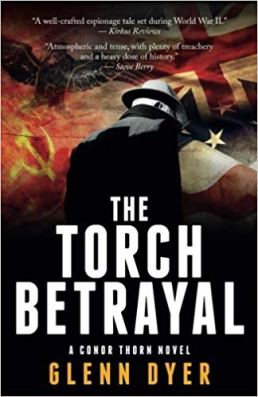
New York Times bestselling author Steve Berry called Glenn Dyer’s The Torch Betrayal “Atmospheric and tense, with plenty of treachery and a heavy dose of history,” and he’s right on the money.
Set during World War II, Dyer’s novel introduces readers to Conor Thorn, an OSS agent coming off a botched mission. Determined to right some wrongs and get back to doing what he does best, Thorn is offered a shot at redemption. Tasked with locating documents related to Operation Torch—a set of intricate battle plans to invade Africa—Thorn’s job is to recover the plans at all costs, no matter what, before they fall into enemy hands. But what starts out as a straightforward mission, soon morphs into anything but, as Thorn uncovers one conspiracy after another, kicking off a chain of dangerous events that leads to a pulse-thumping final act as Dyer delivers a fast-moving story rich with history and suspense.
Agreeing to go on the record for our Five Questions segment, I asked Dyer everything from how he came up with the story idea for this book to what’s next for Thor and company moving forward. Read the full Q&A below, then pick up your copy of The Torch Betrayal, now available.

TRBS: First of all, I really enjoyed the Torch Betrayal. How did you come up with the plot details for this book?
Dyer: I’m very interested in history in general and World War II in particular. I came across a wonderful book written by Captain Harry C. Butcher entitled My Three Years with Eisenhower. Butcher was General Eisenhower’s naval aide from 1942 to 1945. He was a close friend of Eisenhower’s before his stint as his close aide. The book is laid out in a diary form and reveals a tremendous amount of details, both material and minor, about the operations, invasions, politics, planning and just the day to day comings and goings of the staff that Ike surrounded himself with.
There was one entry, dated September 7, 1942, that dealt with the security of Operation Torch, the Allied invasion of North Africa. A document from the Combined Chief’s of Staff containing the first Torch directive to Ike to target the North African coast went missing. The page detailed all the assault areas for Torch. Apparently, Butcher and his staff were responsible for compiling official and personal items into a wartime diary for Ike. During this process, which involved microfilming, this vital page went missing. This breach in security was a major concern of Ike’s moving forward. But I was amazed to find out that Butcher never states whether the page was ever found. I immediately started to form “what if” questions. “What if the document did fall into the hands of enemy spies?” I surmised that since the invasion did go off as planned, the document must have been found otherwise why risk the lives of so many. So, I built a story around what could have happened to that vital missing page. That’s where Conor Thorn comes in.
TRBS: What kind of research did you have to do before actually sitting down to write this book?
Dyer: I did quite a bit of research on Operation Torch, the Office of Strategic Services (OSS) and its chief Bill Donovan. All of which I found fascinating. Then there was research on England in wartime, life in Morocco and other settings like the Vatican and Lisbon in 1942. A trip to London added a great deal of depth to the research. As I said, I love history so it was easy to “get lost” in the research phase of this project.
TRBS: What is your writing process like? Do you have a target word count that you try to hit each day? Do you outline your books?
Dyer: I don’t focus on a word count. I tend to “go with the flow”. If the words are flowing, I go as far as I can. When they aren’t, I don’t force it. I am very dependent on an outline and will spend a great deal of time working on the outline. I include in the outline a slew of details as to the setting, weather, smells, clothing so I don’t forget to add them to the scene. The outline for my next novel in the Conor Thorn series is at 32,000 words at this point in time, and I’m not finished! I truly marvel at those writers that can produce a compelling manuscript by just sitting down at the keyboard or legal pad and letting the words flow.
TRBS: What’s the last really great book that you read, and who are some of your favorite authors?
Dyer: To single out just one great book is tough. That said, Steven Hartov’s The Soul of a Thief, a superb WWII drama, was a fantastic reading experience. As far as favorite authors go, I’ll go with Harlan Coben (from my hometown), Lee Child, David Poyer, Robert Harris, P. T. Deutermann, Daniel Silva, Steve Berry, John Lawton, John Altman, James R. Benn. I could go on.
TRBS: Lastly, what’s next for you, and when can readers expect your next book to come out?
Dyer: Book #2 in the Conor Thorn Series should be out in January of next year. The story revolves around Ultra which was the designation adopted by British military intelligence during WWII for wartime signals intelligence obtained by breaking high-level German encrypted communications at Bletchley Park. It is also inspired by a piece of research that I came across in Anthony Cave Brown’s Bodyguard of Lies.
Praised as “one of today’s finest book reviewers” by New York Times bestselling author Gayle Lynds, Ryan Steck (“The Godfather of the thriller genre” — Ben Coes) has “quickly established himself as the authority on mysteries and thrillers” (Author A.J. Tata). Steck also works full-time as a freelance editor and pens a monthly thriller column for CrimeReads. For more information, be sure to follow him on Twitter and Facebook. He currently lives in Southwest Michigan with his wife and their six children.
